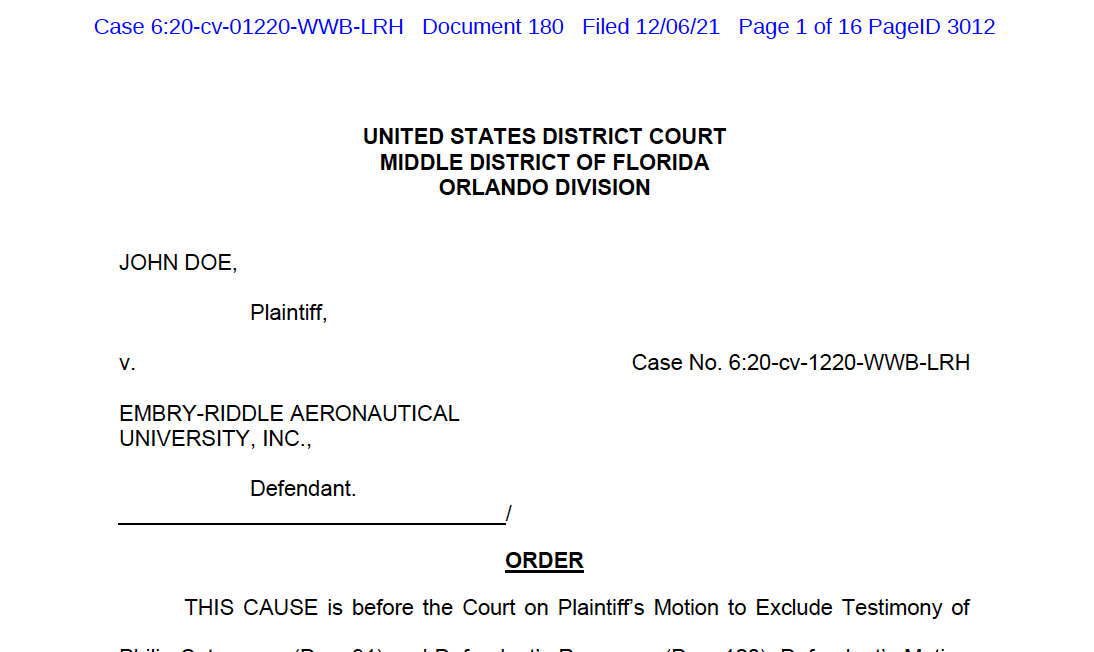
Managing Partner Joshua Engel is scheduled to present at an attorney’s forum on a recent favorable decision in a Title IX case.
The case is Doe v. Embry-Riddle Aeronautical Univ., Inc., 2021 U.S. Dist. LEXIS 213380 (M.D. Fla., Nov. 4, 2021).
In this case, the Plaintiff was a student at Embry-Riddle Aeronautical University, Inc. (“ERAU”), where he was studying to become a pilot and participated in athletics. While he was enrolled at ERAU, Plaintiff invited a fellow student, Jane Roe, to attend a party at his residence on October 26, 2019. When Roe arrived at the party, Plaintiff was intoxicated, having consumed approximately fifteen drinks that evening. Both Plaintiff and Roe consumed alcohol at the party. At some point in the evening, Plaintiff and Roe entered Plaintiff’s bedroom, where the two had sexual intercourse.
In November 2019, Plaintiff was informed by ERAU’s Title IX Coordinator that Roe had alleged that she was incapacitated due to alcohol use at the time of the encounter, rendering the sexual intercourse non-consensual. During his initial meeting with the Coordinator, Plaintiff informed her that he was also intoxicated at the time of the encounter. Plaintiff again raised his own intoxication to ERAU’s investigator on November 19, 2019, and indicated that he wished to pursue a complaint against Roe, but he was discouraged from making such a filing. Shortly thereafter, Plaintiff was suspended from his athletic team. On January 10, 2020, Plaintiff made a formal report of sexual misconduct against Roe.
ERAU issued an Outcome Letter stating that Plaintiff was found to have violated the school’s Sexual Misconduct Policy. He was dismissed from the school at the conclusion of the semester. The letter did not address Plaintiff’s claims of misconduct against Roe. An appeal found evidence that the investigator demonstrated bias in the case, but a new review reached the same outcome. As a result, Plaintiff filed a federal civil rights Complaint against ERAU alleging, in part, a selective enforcement claim under Title IX of the Education Amendments of 1972 (“Title IX”), 20 U.S.C. § 1681 et seq.
The judge denied the school’s motion for summary judgment and indicated that the case should go to trial. The court said, “the record in this case is replete with evidence from which a reasonable jury could infer that any differential treatment was the result of gender bias.” Adding: “In several instances individuals from ERAU… relied on unsubstantiated and gender biased assumptions… A reasonable jury could infer from this evidence that ERAU operated under biased gender stereotypes regarding the role of males and females in giving and obtaining consent for sex.”
A few weeks after this decision, the parties were able to reach a confidential settlement.
Engel will present on strategies related to summary judgment and the use of experts. He will also address Daubert motions.
Engel & Martin, LLC is one of the leading firms nationally in litigating on behalf of students who have been found responsible, or ‘guilty’ in Title IX sexual misconduct disciplinary proceedings. Engel & Martin, LLC represented the accused student in the landmark case of Doe v. University of Cincinnati — the case establishing the right of students to cross-examine adverse witnesses in school disciplinary proceedings at public colleges and universities.
